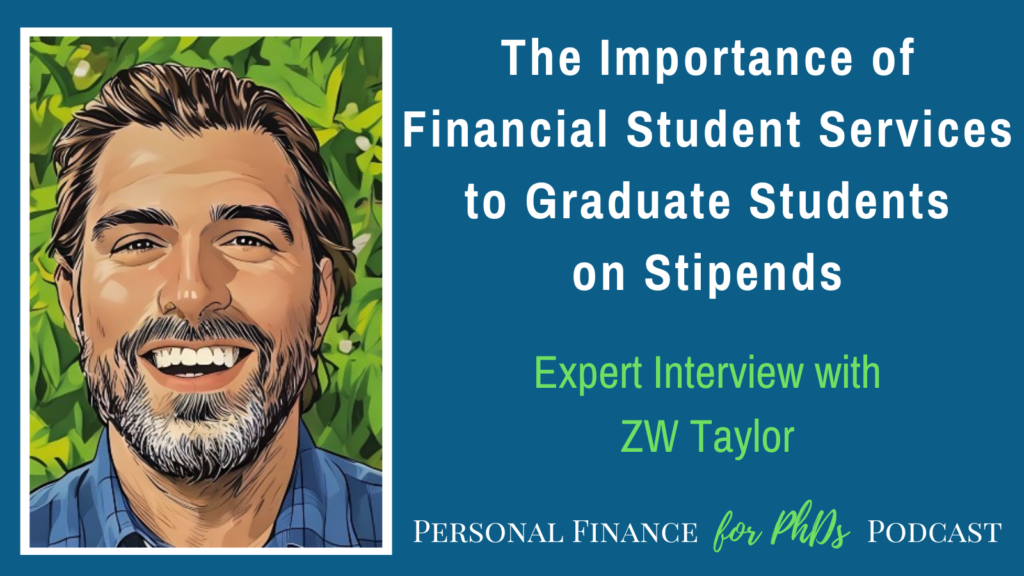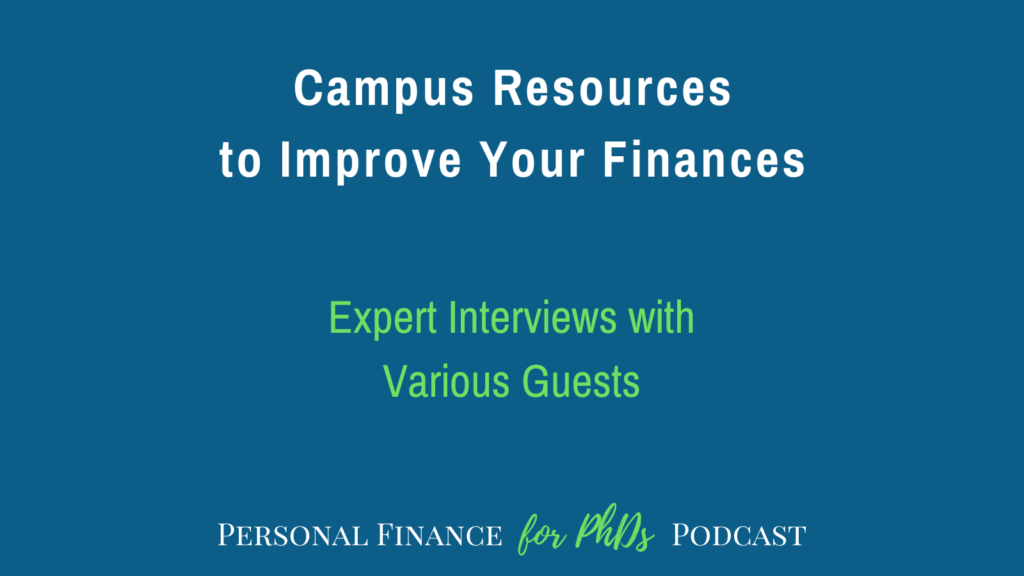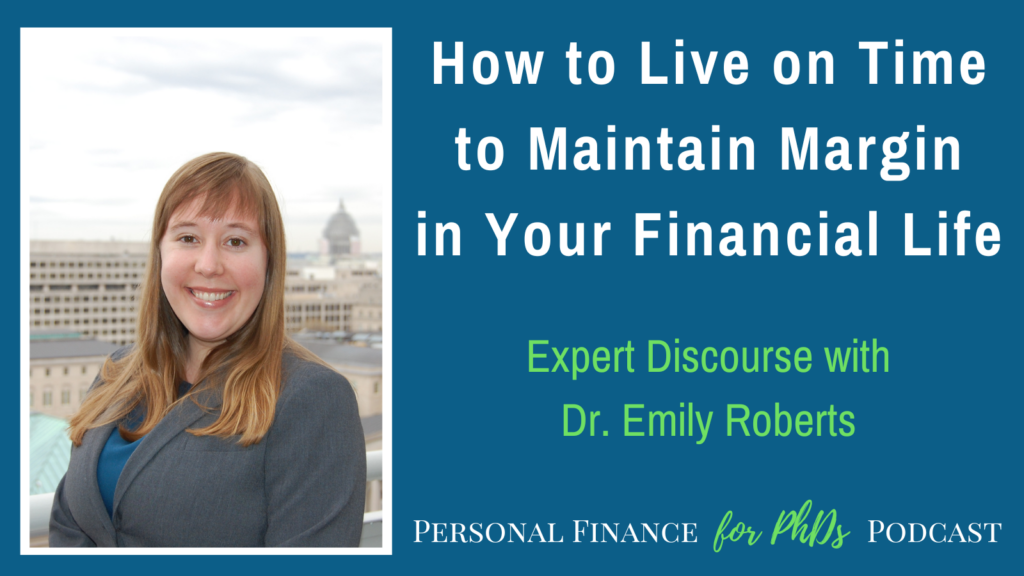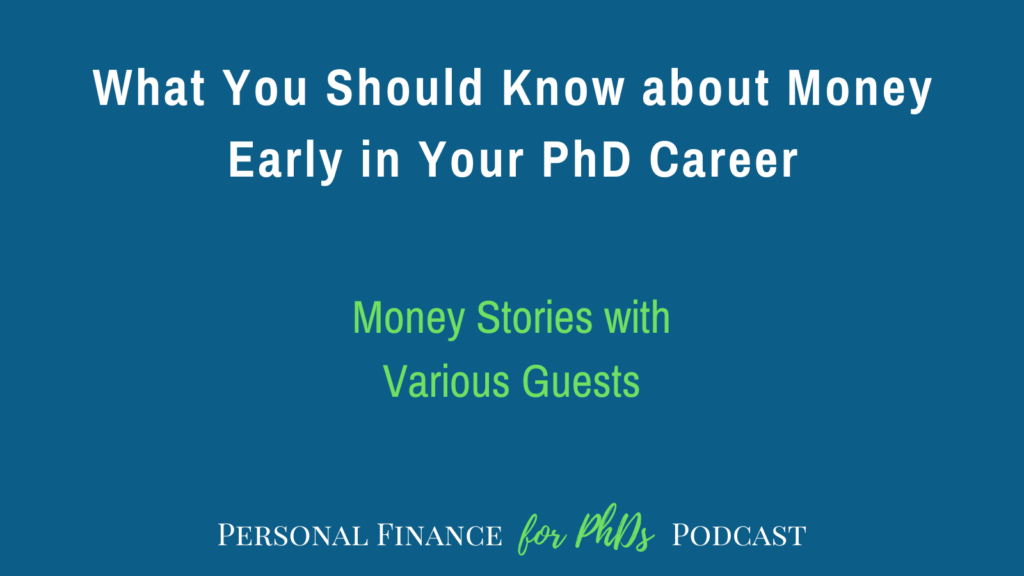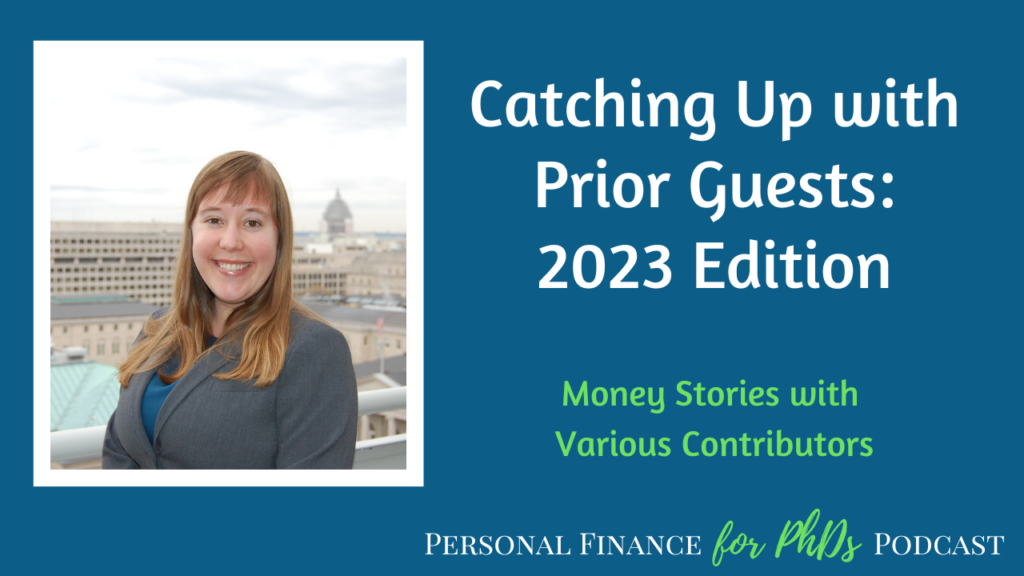Emily published the first episode of this podcast in July 2018. This is the 246rd episode, and over the last six and a half years, the podcast has featured over 300 unique voices in addition to her own. For our last episode in 2025, we are catching up with the guests from Seasons 15 through 17, and a few from earlier seasons as well. The guests were invited to submit short audio clips to update us on how their lives and careers have evolved since the time of their interview, as well as to provide their best financial advice if that has changed since that initial interview.
Links mentioned in the Episode
- PF for PhDs Podcast Hub
- PF for PhDs Subscribe to Mailing List
- Emily’s E-mail Address
- PF for PhDs S17E5: Can You Earn Money from Publishing a Scholarly Book?
- Dr. Laura Portwood-Stacer’s Books
- Dr. Ana Romero Morales’ Website: Brewing Dinero
- PF for PhDs S14E3: Navigating Grad Student Finances While Undocumented
- PF for PhDs S16E1: How This Grad Student Budgeted for Having Her First Child
- Madeline Hebert’s Twitter/X
- Host a PF for PhDs Tax Seminar at Your Institution
- PF for PhDs S13E2: This PhD Student-Nurse Is Confident in Her Self-Worth
- Dr. Brenda Olmos’ LinkedIn
- Dr. Brenda Olmos’ Instagram
- PF for PhDs S8E3: Knowing Your Worth in an Environment that Devalues Your Work
- PF for PhDs S4E19: How Effective Presentations Advance Your Career and Improve Your Finances
- Dr. Echo Rivera’s Youtube Channel: More Than PowerPoint
- Dr. Echo Rivera’s Website
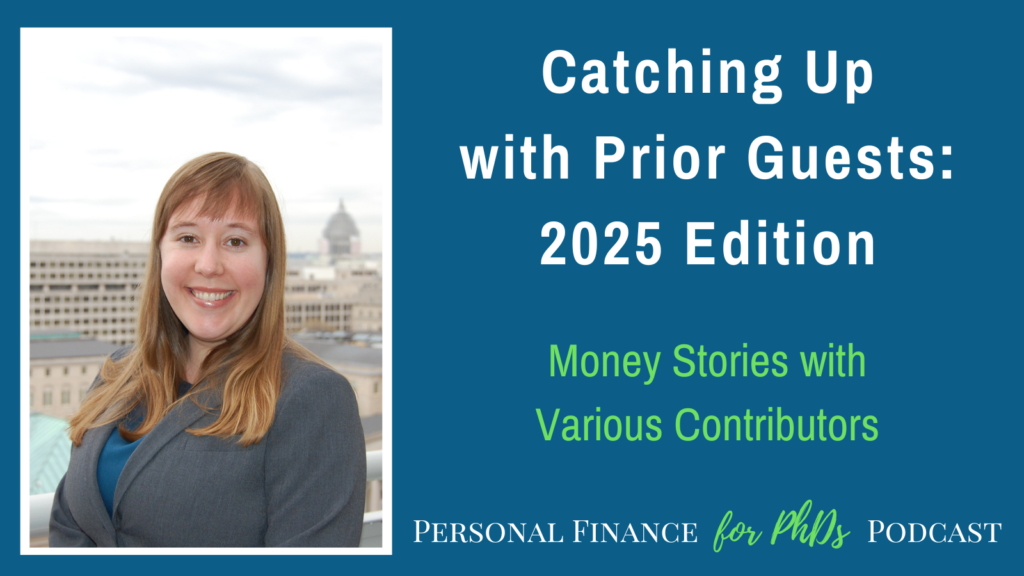
Introduction
Emily (00:00): Welcome to the Personal Finance for PhDs Podcast: A Higher Education in Personal Finance. This podcast is for PhDs and PhDs-to-be who want to explore the hidden curriculum of finances to learn the best practices for money management, career advancement, and advocacy for yourself and others. I’m your host, Dr. Emily Roberts, a financial educator specializing in early-career PhDs and founder of Personal Finance for PhDs.
Emily (00:28): This is Season 22, Episode 9, and today I am featuring several past guests! I published the first episode of this podcast in July 2018. This is the 246th episode, and over the last seven and a half years, the podcast has featured over 300 unique voices in addition to my own. For our last episode in 2025, we are catching up with the guests from Seasons 15 through 17, and a few from earlier seasons as well. I invited them to submit short audio clips to update us on how their lives and careers have evolved since the time of our interview, as well as to provide their best financial advice if that has changed since our initial interview. The audio clips in this episode are ordered by when the original episode was published, most recent to least recent. If you’d like to circle back and listen to any of the previous interviews, you can do so in your podcatcher app or at my website, PFforPhDs.com/podcast. To keep up with future episodes, please hit subscribe on that podcatcher and/or join my mailing list at PFforPhDs.com/advice. You’ll hear an update from me first, followed by the rest of the guests. You can find the show notes for this episode at PFforPhDs.com/s22e9/. Happy listening, happy holidays, and happy new year! See you in 2026!
Dr. Emily Roberts
Emily (02:05): Hi! This is Emily Roberts from Personal Finance for PhDs. I am of course the host of this podcast and you hear from me in every episode! As in previous years, I’ll give you a personal update and then a business update. Personally, I’ve had a great year but perhaps a quieter year and more home-focused than 2024. For example, my family took two vacations this year, one to the Grand Canyon over spring break and one staycation in San Diego over the summer, and the staycation was honestly awesome. I definitely want to do more of that going forward. My husband and I also oversaw some home renovations due to water damage that seemed to go on forever but have thankfully finished now, and we’re really enjoying the remodeled aspects of our home. My daughters are in fourth and second grade, and these are such fun ages. They have lots of activities of course, but I’m really enjoying the ones we can participate in together as a family, like Girl Scouts, tennis, and baking. For myself individually, I’m a three times per week regular at Orange Theory Fitness and loving how I’m feeling. But my reading stats are down! I’ve only finished 37 books so far this year. Another 2025 highlight was attending my brother’s wedding—you know Sam from our prior podcast interviews—I was a bridesmaid, my husband was a groomsman, and my daughters were junior bridesmaids. To sum up, I can honestly say that I’m very happy and satisfied with my personal life right now.
Emily (03:34): As for Personal Finance for PhDs the business, as someone who works adjacent to academia obviously I have been following the political landscape and experiencing some secondhand ups and downs. Starting in March, I was really concerned with the viability of my business. Thankfully, I was somewhat reassured by my interactions with past and prospective university clients at the conferences I attended over the summer and even more reassured once speaking engagements started lining up for the fall semester. Some of my previous clients were unable to hire me this year but others did and I worked with a few new clients as well. Overall, my business made approximately the same amount of money in 2025 as in 2024, so I will take that as a win. This year, I also gave myself a non-revenue-generating project to occupy my time. Over the summer, I took a course to write a book proposal, which I submitted to a few university presses in the fall. As of the moment I’m recording this, my proposal is under peer review at two presses, and the reviews that have come back so far have been very supportive of publication. I’m hoping to receive at least one advance contract offer in the next month or two. I’ve started writing the book, which is great, but I don’t think I’ll really feel underway with that until I know who will publish it, so that’s coming soon. The subject of the book, as you might imagine, is personal finance for stipend-receiving PhD students. I’ve been sharing updates on the book and the publication process on my YouTube channel, Personal Finance for PhDs, so check that out if you want to follow along.
Thanks for listening to my update! If you want to get in touch, you can visit my website at PFforPhDs.com or email me at [email protected].
Dr. Laura Portwood-Stacer
Laura (05:23): I’m Laura Portwood-Stacer and I appeared on season 17, episode five titled, Can You Earn Money From Publishing a Scholarly Book? I’m a developmental editor and publishing advisor for scholars who want to publish books. My editorial business is called Manuscript Works and my 2021 book, The Book Proposal Book has helped thousands of scholarly authors navigate the book publishing process. My big news for 2025 is that I had a new book come out also in Princeton University Press’s Skills for Scholars series, just like The Book Proposal Book was. My new book is called Make Your Manuscript Work, and it walks readers through the process of preparing a manuscript for a book or any kind of scholarly text to ensure that it’s publishable. One of the big lessons in my new book is that in order to evaluate whether your manuscript is working, you need to get clear on what your mission is, meaning what are your goals in trying to get published in the first place?
Laura (06:18): On my previous podcast episode with Emily, we talked about earning money as one possible goal someone might have when publishing a scholarly book. On that episode, I pointed out that the financial rewards associated with publishing a scholarly book often do not come from the publishing contract itself, but if your book lands successfully with your dream publisher and reaches your intended audiences effectively, then you can often leverage your book publication into other income generating opportunities. In my new book, Make Your Manuscript Work, I encourage writers to think about those opportunities upfront before getting too far into the revision process. What do you want your book to do and who do you need to reach in order to accomplish that? Having clear answers to those questions can make the revision process so much more straightforward and ensure that all the time and labor you pour into writing your book will actually have tangible outcomes on the other side of publication.
Laura (07:14): I’ll use my own new book as an example. Although my publisher paid me a decent advance payment for my new book writing, it actually represented a loss of money for me because of the opportunity costs. Every hour I spent writing the book was an hour I couldn’t spend working with a client or creating a course or workshop that would earn me revenue. My editing and advising business took a 20% income hit in 2024 because so much of my time went into finishing my book. Yet in 2025, I was able to leverage the work I’d done on the new book into a new online course, the manuscript development workshop where I offer hands-on guidance to writers who are working toward publishing a scholarly book or article. By leveraging the new book into a new course, I was able to get my 2025 income back to the level I wanted it to be, and I hope the book publication will continue to introduce me to new writers who may want to work with me in the future because I knew that’s what I wanted my new book to do. I wrote it very intentionally as a practical and accessible guide that teaches my way of working on manuscripts. My book will help thousands of scholarly writers who will never work with me personally and at the same time, the book works as a calling card for my courses and services. If you’d like to write a book, I encourage you to think of it in similarly practical terms. Writing a book will likely cost you something in the short term, but the long-term payoffs can be even greater than the costs if you write and publish your manuscript effectively. To learn more about both of my books for scholarly writers and to see how they can help you achieve your own publishing goals, you can check out my website at manuscriptworks.com/book.
Dr. Ana Romero Morales
Ana (08:58): Hello everyone, I am Ana Romero Morales and I’m the founder of Brewing Dinero. I apologize as I am getting over being sick. I was on the personal finance for PhD’s podcast season 14, episode three on the podcast, I spoke about my financial and graduate experiences as a DACA recipient, resources for undocumented graduate students and ethical boundaries to consider between personal finance and mental health. Since being on the podcast, I had my first baby, moved from the Midwest to the west coast, and I’m actually uh, soon to have another baby girl. The transition to the west coast has been easy and hard in different ways. Of course, having to adjust to a higher cost of living, but also enjoying being close to family and watching my daughter be loved by her aunts, grandparents and extended family. As parents now we’ve had to adjust our financial goals and take on additional expenses that comes with raising little human beings along with the move.
Ana (10:07): I started a new job as a child psychologist while continuing to facilitate workshops for first gen college students and working with my clients that are in my six month coaching program. 2025 has been quite a year in terms of politics and its impact on undocumented communities. It is a scary time to be undocumented or a DACA recipient trying to pursue graduate schools when laws are being implemented to limit one’s access, especially in some states over others. I wish I could say something to make it all better, but the fear is real. If you know, you know. What I can say is continue to reach out to commu, to your community for support. If you are in graduate school, talk to your department about ways to support your ability to finish your degree, and if you’re thinking about graduate school or looking for other resources, remember that there are still organizations out there providing access to grants and scholarships that don’t require US citizenship.
Madeline Hebert
Madeline (11:17): Hi, my name is Madeline Hebert. I interviewed for this podcast back around June of 2023, which aired as season 16 episode one. During it we spoke about how I budgeted for the arrival of my first child as a second year PhD student. Since then, we’re actually expecting our second and the way we’re budgeting for this one is based a lot on what I learned from my experiences from having the first. I think that the one thing I wish someone had told me that I know now and is my advice for early career PhDs is that you really can and need to do what’s best for you in your situation with your personal goals and values, and this advice holds true beyond financial choices, as I’ve found it also applies to decisions related to your dissertation and career exploration. For me, it’s appeared in realizing that even though we could buy a home, it wasn’t best for us.
Madeline (12:09): On the flip side, we found that it actually benefits us more to have our second and I remain in graduate school as opposed to going for a full-time job and leaving even if just for a year. I think that some people have always known or abided by this advice, but I for one have always wanted to know what’s the right or best or most efficient choice, and I’ve just come to accept that it really does look different for each person, and so as much as it may be daunting, it really does benefit you to know your options and it doesn’t have to be overwhelming or a complex Excel sheet or multiple savings accounts as you might hear if you look back on my episode, it just needs to work for you and if it’s not working for you or even if it used to but no longer does, then it’s okay to pause and revisit your options. I think accepting this sooner would’ve saved me a lot of financial anxiety, stress, and time spent looking at my banking accounts, so that’s my best advice for early career PhDs. Now you can find me on the University of Connecticut’s graduate student page or on Twitter/X @SRIQResearch.
Commercial
Emily (13:18): Emily here for a brief interlude! I’m hard at work behind the scenes updating my suite of tax return preparation workshops for tax year 2025. These educational workshops explain how to identify, calculate, and report your higher education-related income and expenses on your federal tax return. For the 2025 tax season starting in January 2026, I’m offering live and pre-recorded workshops for US citizen/resident graduate students, postdocs, and postbacs and non-resident graduate students and postdocs. Would you please reach out to your graduate school, graduate student government, postdoc office, international house, fellowship coordinator, etc. to request that they host one or more of these workshops for you and your peers? I’d love to receive a warm introduction to a potential sponsor this fall so we can hit the ground running in January serving those early bird filers. You can find more information about hosting these workshops at P F f o r P h D s dot com slash tax dash workshops. Please pass that page on to the potential sponsor. Now back to our interview.
Dr. Brenda Olmos
Brenda (14:36): Hi Emily. It’s good to connect with you again. This is Brenda Olmos or Dr. Olmos, if you will, and I was on season 13, episode two in September of 2022. At that time, I had started my third and final year of my PhD program and I defended my dissertation in July of 2023 Since the episode I got married, moved in with my husband, started a job in industry in March of 2024 and started maxing out my retirement accounts again. I knew at the end of my PhD that I did not want to pursue a tenure track academic career right away, partially because a postdoc or an academic salary were much less than my salary prior to my PhD and partially because I knew my research would be difficult to fund. It was based on healthcare discrimination and minoritized groups. I am now the administrator of education and development for advanced practice providers in a large health system in central Texas, and I really enjoy my work.
Brenda (15:33): I am the first person in this role, so I have been able to mold the position to my strengths and I build orientation curriculum for new clinicians, plan and lead skills workshops, and soon we’ll be starting two specialty clinical fellowships for nurse practitioners and physician associates. I feel this job utilizes my strengths and it pays more than I made when I was a nurse practitioner prior to my PhD, so I’m happy with where I landed post PhD. I still consider an academic career maybe in my future, but maybe more in administration than in research. My best financial advice for an early career PhD is to get out of debt as soon as possible. In my episode, I had talked about how I didn’t take on any debt for my PhD since it was funded, and I would also say start investing again asap. I am back on track now to retire at age 50 if I choose, but I do see myself working until 60 or beyond since I do enjoy my work and I finally feel like it’s sustainable. If I were starting my PhD again today, I would probably spend a lot less than I did so I could invest a bit more in that time, but the spending got me through the hard time, so I don’t really have any regrets. I don’t have a brand or a website, but I can be found on LinkedIn with my name Brenda Olmos and on Instagram as AlmostBrenda, A-L-M-O-S-T. Brenda, thanks for including me in this and have a great holiday season.
Dr. Samantha McDonald
Samantha (17:00): Hi there. This is Samantha McDonald. I was on season eight episode three and the title of my episode was Knowing Your Worth in an Environment that Devalues Your Work. Um, I think a lot has changed in the most recent update since I graduated from UCI. I ended up working at Meta the tech giant for a few years, um, continuing the same sort of savings pathway and knowing my worth and how much I was in the tech world, but I actually decided to leave Silicon Valley and spend almost three years unemployed <laugh> intentionally so on a what my partner and I call a sea sabbatical, SEA, living on our sailboat and sailing around the Pacific Ocean for a few years, which was amazing. And then after spending some time away from work and employment, I just recently came back into employment as a lecturer and professional track faculty at the University of Maryland in the School of Information.
Samantha (18:11): So my life kept taking a 180 from a tech giant to unemployment, uh, and sabbatical to being back in academia. Um, I don’t have any change, I think in advice for financial advice. I think a lot of what I said stays the same of knowing your worth in a place that oftentimes feels like you’re competing for the pennies and the scraps with how much people are undervalued as graduate students. I don’t think that has changed. I do think that the new generation coming in, uh, especially when I talk to undergrads, are much better at knowing their worth than I think previous generations. So I think that’s the biggest change where I think a lot of my advice is becoming more and more obvious for the next generation, but I still feel like it’s a struggle for people to understand how to value themselves in graduate school in a place where there is a lot of struggle financially, um, happening.
Samantha (19:11): So I don’t know if that has particularly changed, but um, yeah, everything is going great. Um, being back in academia has definitely been a crazy shift, but one that I’m happy to be in and I am definitely still on the path of financial independence and one of the beauties of how much I was able to save in graduate school and my time just for a few years in tech, it was I was able to financially afford taking a few years off while I’m still young and have adventures and do all these things before you either become too old or too dependent on other living beings, whether it be children or grandparents or parents to do those things. So everyone told us when we bought a boat, go small, go now. And that’s exactly what we did when we were young and we’re, we have no regrets of doing that.
Dr. Echo Rivera
Echo (20:06): Hello, this is Dr. Echo Rivera from season four, episode 19. I help PhD students end death by PowerPoint and create more visually engaging talks and lectures. Well, so much has changed in the last six years, and I first want to acknowledge that the future might feel really bleak for PhD students and academia in general. It’s been a really bad year, but keep going. You can still do this. You can get through this and you will find a way, and my best financial advice for every PhD student right now is to make sure you don’t put all your eggs in one basket. What I mean by that is to make sure you aren’t hyper-focusing on just one specialized skill branch out and be multi-skilled because those are the people getting hired, keeping their jobs and getting promoted. Even now, for example, PhDs who can run advanced stats or use R or whatever are kind of a dime a dozen now because every student is told to prioritize those types of technical skills.
Echo (21:23): Just about every PhD student is told to focus on pubs above everything else, et cetera. So that’s what I mean, like consider the advice you are being given about what to prioritize and assume that every other PhD student in the world was told to do the same thing. Now, I don’t say that to make you depressed, like don’t get depressed about it. Use that to your advantage. Think about the thing you’ve been told to deprioritize too, because chances are every other PhD student has been told the same thing, which means if you can shine at that thing, that thing that no one else is good at, then you are going to shine as the competitive must hire. And guess what meets that criteria? Engaging, effective, powerful presentation skills. Every grad student is told to deprioritize that, put it on the back burner. Don’t worry about it.
Echo (22:27): Few other grad students are developing these skills. So do you see what that means? If you are the one who can do both, run advanced stats and visually explain it in a way that everybody loves, that’s the competitive must hire. Do not wait until your job talk to take that seriously. Do not wait for your postdoc to take that seriously. It will be too late. Trust me, I’m the one that gets the panicked, heartbreaking emails and I’m the one who sees what those draft job talk presentations look like. I cannot stress this enough. Please, you need to start now, but I promise we can make it fun and empowering. Come over and check me out on YouTube. Search my name, Echo Rivera. The channel is called More Than PowerPoint, and visit my website echorivera.com for free training. I’ve got lots of resources to help you. I will make you a communication star. I got your back. Let’s do this. Okay, have a good day. Bye everyone.
Outro
Emily (23:45): Listeners, thank you for joining me for this episode! I have a gift for you! You know that final question I ask of all my guests regarding their best financial advice? My team has collected short summaries of all the answers ever given on the podcast into a document that is updated with each new episode release. You can gain access to it by registering for my mailing list at PFforPhDs.com/advice/. Would you like to access transcripts or videos of each episode? I link the show notes for each episode from PFforPhDs.com/podcast/. See you in the next episode, and remember: You don’t have to have a PhD to succeed with personal finance… but it helps! Nothing you hear on this podcast should be taken as financial, tax, or legal advice for any individual. The music is “Stages of Awakening” by Podington Bear from the Free Music Archive and is shared under CC by NC. Podcast editing by me and show notes creation by Dr. Jill Hoffman.
